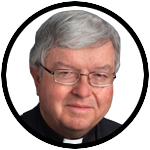
Father Kenneth Doyle
Q. My wife is Catholic and I am Methodist. We were married 35 years ago in a Catholic church, and we raised our children as Catholic, including Catholic schools. We attend our Catholic parish regularly. I respect the rules of the Catholic Church regarding my not being allowed to receive Communion as a non-Catholic.
But we recently attended Ash Wednesday services at the parish, and I was wondering whether you had to be a Catholic to receive the ashes, or is the rule the same as for the sacraments? (Roanoke, Virginia)
A. You are certainly welcome to receive ashes at a Catholic ceremony. The Roman Missal, in fact, instructs Catholic priests simply to place “ashes on the head of all those present who come to him.” Ashes serve as a sign of repentance for wrongdoing, a praiseworthy attitude common to all Christians, and increasingly Protestant churches of many denominations are offering ashes at their own services to begin the Lenten season.
[hotblock]
You are correct, though, in making the distinction between ashes and the sacrament of holy Communion. Often in missalettes there are found guidelines from the U.S. Conference of Catholic Bishops that explain that “because Catholics believe that the celebration of the Eucharist is a sign of the reality of the oneness of faith, life and worship, members of those churches with whom we are not yet fully united are ordinarily not admitted to holy Communion.”
Unlike the ashes, which are simply a sign of penance, the Eucharist signifies that the recipient is a member of the wider Catholic community, united with the bishop of the local church and with the pope.
(In certain situations in which the non-Catholic shares the Catholic understanding of the meaning of the Eucharist and lacks access to a minister of his or her own faith tradition, a non-Catholic may, with a bishop’s permission, be admitted to holy Communion, but in most circumstances only Catholics receive the Eucharist.)
Q. This may be more of a history question, but could you address the life of Jesus from birth until he was 30? Did he have a normal childhood? Did he always live at home until his public ministry began? How many people knew who he was throughout those earlier years?
(We hear of the Magi being aware of Christ’s existence, and we read about his teaching in the Temple once as a young boy, but then nothing more until he was 30.) (Curious in Missouri)
A. The period of Christ’s life that you ask about — from infancy until he began his public ministry — is sometimes referred to as the “hidden years” of Jesus. Matthew in his Gospel describes the birth of Jesus, the adoration of the Magi, the flight into Egypt, the slaughter of the innocents and the return to Nazareth. Luke adds the visit of the shepherds, the circumcision and the purification of Mary.
[hotblock2]
Beyond that, the Scriptures are largely silent — apart from the time Christ was found at the age of 12, to his parents’ consternation, speaking with the elders in the Temple at Jerusalem.
Apocryphal writings have tried mightily to fill in the gaps: the Infancy Gospel of Thomas (second century), Pseudo-Matthew (sixth to seventh century), the Arabic Infancy Gospel (probably sixth century). They are fanciful and largely incredible accounts of childhood exploits of Christ. One story tells of Jesus, at age 7, fashioning clay animals with his friends, then blowing on them to make them fly. The other boys tell this to their parents who warn them not to play with Jesus.
In answer to your question, I would say that Jesus did have a “normal childhood.” Luke says simply that “Jesus advanced in wisdom and age and favor before God and man” (2:52). Jesus would have spoken Aramaic (the common language of Palestine at the time) and probably some Greek (learned largely from regular pilgrimages with his family to the then-Hellenized city of Jerusalem).
He would have been educated in the Scriptures by Mary and Joseph, as well as at the synagogue in Nazareth — although he evidently had no formal training in the higher rabbinic schools of his day. Remember how the Jews had voiced their surprise that the “carpenter’s son” could have spoken so knowledgeably at the Feast of Tabernacles? “How does he know Scripture without having studied?” (Jn 7:15).
The traditional Catholic teaching is that Mary was given to know the true identity of her Son at the annunciation (Lk 1), and Joseph (Mt 1:21) was told this by an angel in a dream. Beyond that, I would think that a belief in Christ’s divinity was very gradual in the minds of his contemporaries and did not fully blossom until after the resurrection.
To me, the “normal-ness” of the early life of Christ argues all the more strongly for the credibility of the Gospel; it is far from what one would expect in a biography of the Savior of the world.
***
Questions may be sent to Father Kenneth Doyle at askfatherdoyle@gmail.com and 30 Columbia Circle Dr., Albany, New York 12203.
PREVIOUS: Confessional is a place of forgiveness, not threats, pope says
NEXT: Readings of the Holy Mass – Third Sunday of Lent



Share this story